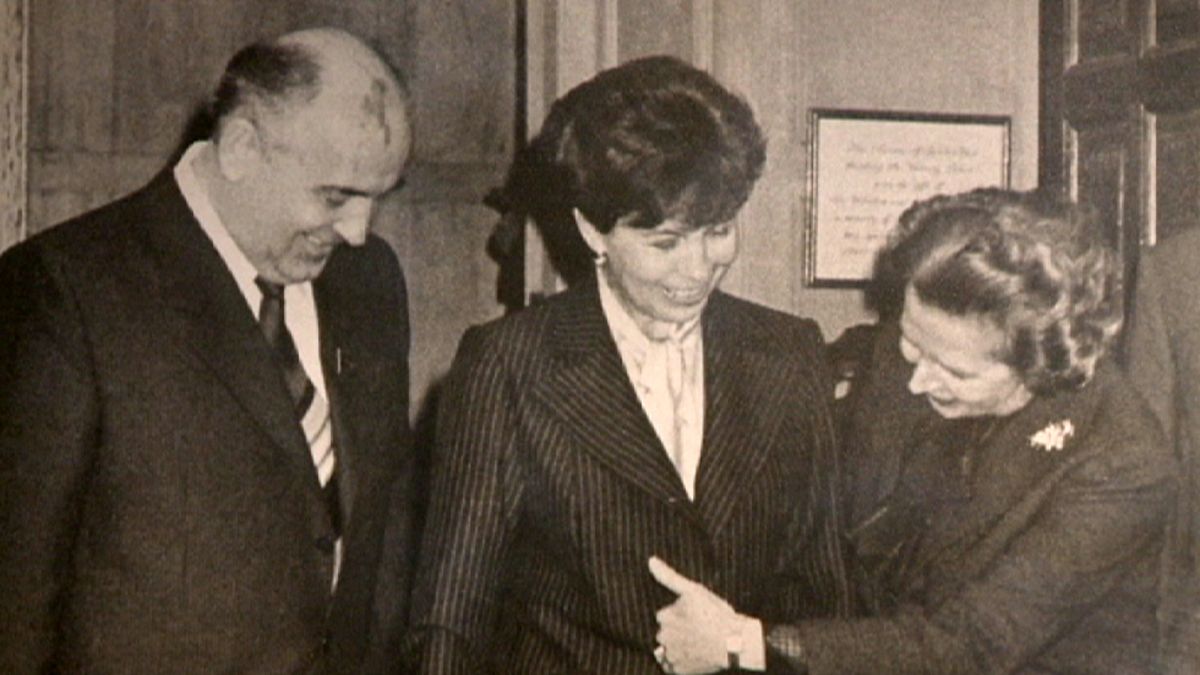“Mr Gorbachev, open this gate…”
This famous invitation from US President Ronald Reagan was extended beside the Berlin Wall in June 1987, appealing to the USSR’s first and only president.
“Mr. Gorbachev, tear down this wall!”
Arguably Reagan’s greatest phrase, he forgot it, along with Gorbachev according to the translator of their official talks and conversations Pavel Palazhchenko.
“Surely, it was an appearance designed to dazzle, but Moscow considered it a theatrical gesture. And Gorbachev, when asked afterwards, used to say,” We know that the first profession of President Reagan was acting”. Because it was obvious that Gorbachev could not tear down the wall. And when the wall fell, it was by the will and decision of Germans,” he says.
A fragment of the Berlin Wall is in a prominent place in Gorbachev’s office. But a quarter-century ago neither he nor German Chancellor Helmut Kohl could have imagined such a rapid unification of Germany. Britain’s Margaret Thatcher and France’s François Mitterrand were even a little scared, claims Pavel.
“Thatcher was certainly very concerned. I can say it for sure. I saw her in those months, those years. I’ll tell you more: she was concerned even about velvet revolutions in Central Europe. A paradoxical position, because, of course, these were capitalist revolutions. And if there existed a supporter of real, unregulated capitalism, it was Thatcher. However, she had also a desire for stability.
Mitterrand took a similar position. He actively supported us in preventing the creation of additional military infrastructure in Eastern Germany, in non-deployment of nuclear weapons and additional troops in Germany and in the reduction of those troops”.
Igor Maksimychev worked in 1989 as a Minister-Counselor at the Soviet Embassy in Germany. He recalls that the fall of Berlin wall was not perceived in the Kremlin as a tragedy at all.
“Gorbachev was happy. Happy with the fact that finally the problem of the wall was eliminated. It didn’t exist anymore. And it was eliminated by Germans themselves. We were not involved in this liquidation and not responsible for the consequences,” he says.
Today the Kremlin’s approach to the events of the late 80’s is different. Many critics believe that Gorbachev should have been tougher and, in exchange for German unification, made the West guarantee Moscow’s interests in Europe.
“All these things were promised to us, but promised verbally. Without documents. Without written obligations. And then it turned out that nobody owed us anything. And finally, did NATO go east? Yes, it did,” smiles Maksimychev.
Pavel Palazhchenko agrees clarity was lacking:
“At that time assurances about Eastern Europe could not be given. Because those countries were still members of the Warsaw Pact. But even when the Warsaw Pact ceased to exist, the question of the accession of these countries to NATO was never raised.”
The big geopolitical game became a part of some Soviet citizens’ personal histories. History partially preserved in the Museum of the Soviet Army.
Andrei Rakhmanin was a Soviet Army Officer in 1989.
“These missiles in the museum were in Germany before withdrawal of our troops from there… But some of them are still in the army now…”
Andrei Rakhmanin and Alexander Balashov served in the Western group of the Red Army. November 9, the day the border with Western Germany opened, Andrei was on checkpoint duty when a group of celebrating Germans arrived at the gate, drinking and shouting.
“I came out and said: ‘I understand, it is a big event but still it is not a place for drinking’. They replied, ‘Yes, a big event! A terrible tragedy! Those idiots decided to unite us with the westerners. Come and drink with us, Russian officer’”.
But the next six months, between the fall of the wall and establishment of the unified Germany, were quite tough on Soviet soldiers. Once “allies”, they were now sometimes were treated as occupiers.
“Some boys, like ten years old, were playing at war. They had sticks for guns in their hands. So our military column was driving along and they raised their sticks and started shooting at us. Not a very nice impression,” says Alexander Balashov.
A quarter-century later souvenir stalls on Red Square are a kind of national political barometer. Demand creates supply. You can easily find matrioshkas, (Russian dolls), depicting “hardline” Soviet leaders like Putin, Stalin and Lenin. But Mikhail Gorbachev, one of the authors of German unification and a great friend of the West, is harder and harder to find.
